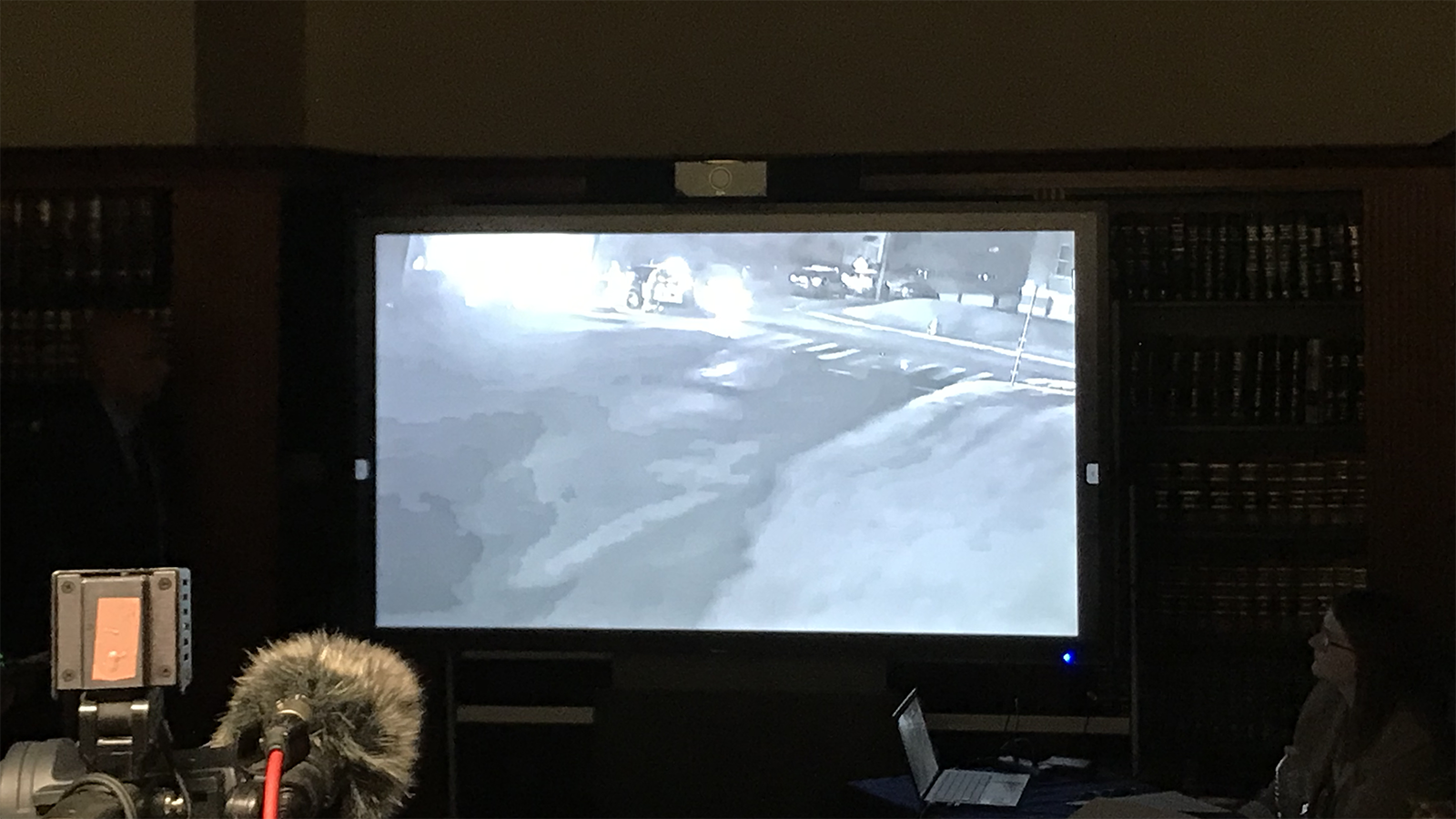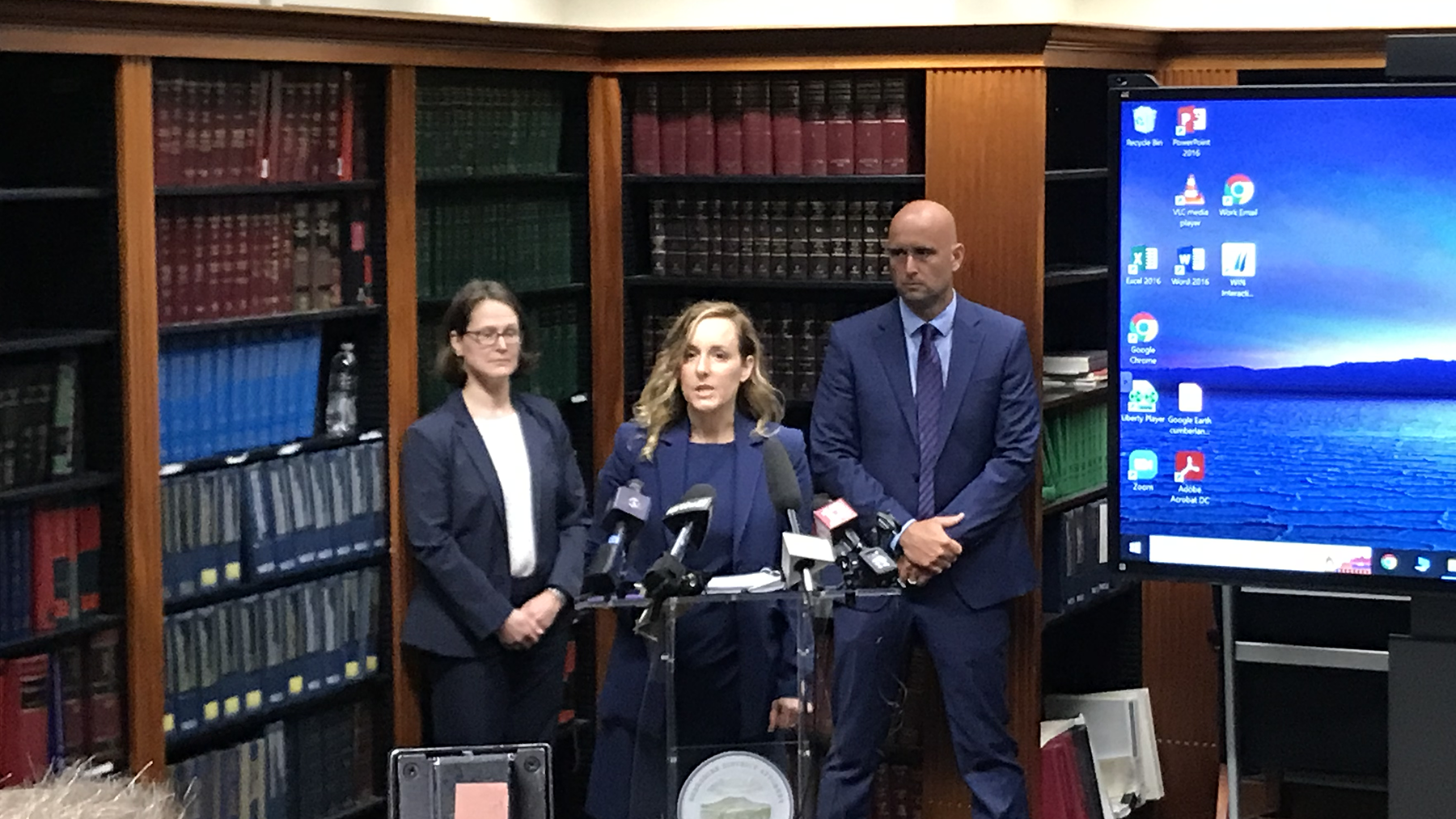Podcast (top-left-corner): Play in new window | Download
On Friday afternoon, Berkshire County District Attorney Andrea Harrington hosted a press conference in her office to reveal her office’s findings of the criminal investigation into the March 25 fatal shooting of Pittsfield resident Miguel Estrella by Pittsfield Police Department officer, Nicholas Sondrini. Almost the entirety of the event was dedicated to recreating the timeline of events that ended any chance of Estrella getting the mental health treatment he so desperately needed that night.
The five-month investigation was deeply and structurally flawed from the beginning, a fact that the Greylock Glass will examine in an upcoming piece. The presentation of the report of the D.A.’s findings was, however, exceedingly well-crafted in one regard — fairly superfluous and redundant bits of evidence were cycled through, slowly, with lengthy explanations in between to stretch the press conference to almost an hour and a half on a Friday afternoon. An hour and a half to explain the crucial 109 seconds between the arrival of Officer Sondrini and the firing of two rounds into Miguel Estrella’s torso.
According to Harrington’s report, Officer Christopher Coffey, first to arrive on the scene, immediately “stepped out of his cruiser, drew his taser, turned it on and pointed it at Estrella,” shouting “commands to Mr. Estrella to drop the knife.”
Already, any hope of de-escalation had been shattered. In fact, experts believe sending in uniformed officers may have been the departments first mistake, knowing that Estrella’s family believed him to be suffering a mental health lapse.
We speak in this episode with Bob Fleischner, former police officer and now Senior Consultant to the Massachusetts Association for Mental Health. Since 1913, the MAM has worked to improve understanding of mental health conditions and combat disparities in health services access. And the organization is at the forefront of study into best practices for law enforcement personal when assisting individuals in the midst of mental health crises.
NTRVW: Bob Fleischner, Massachusetts Association for Mental Health
Thanks so much for taking time to speak with the Top Left Corner today.
Bob Fleischner: You’re welcome.
Top Left Corner: Now be here. It’s it’s it’s. I wish I wish that we had not such tragic circumstances to bring you on the show. Clearly, our community is is shaken by the death of Miguel Estrada. And Pittsfield is asking a lot of questions right now. And I’m hoping not to, you know, chase the details. The play by play of how this case is is turning out. But to kind of get to the to as you pointed out in the the mentioned in the green room, the digital green room, the foundational drivers. First, before we get to the details, just do me a favor and explain a little bit what your organization is all about.
Bob Fleischner: The Massachusetts Association for Mental Health is the oldest mental health advocacy organization in Massachusetts, founded over 100 years ago and one of the oldest in the United States. And Mama is committed to ensuring access to people with experiencing mental health and emotional difficulties to services on an equitable basis, and to ensure that work to ensure that that people in this state are able to get services that they want in settings that are appropriate.
Top Left Corner: Excellent. So this is this is interesting because obviously, when things are the oldest in Massachusetts that just by by default often makes them the oldest in the country or close to give us some background. Obviously, you weren’t you weren’t around in 1920 or so. But what are what are some of the stigmas attached to mental health that have been around and that still pervade the thinking of both the public and and responders like such as the police and maybe even medical care.
Bob Fleischner: Well, the stigmas have been the same for hundreds of years. And in the context of what we’re talking about today, probably the most. A serious thing that attaches to people who are experiencing difficulties or emotional difficulties is that they are somehow dangerous to themselves or others. And there is an aura and a belief, I think generally among people in the population and probably among first responders and law enforcement people, that if a person has a mental illness, that they are likely to be dangerous. The evidence is quite the contrary. The evidence is that people with mental health difficulties are more likely to be victims of crime. Hmm. So that’s that’s one of the stigmas. The other stigma is that we don’t, as a society, talk much about mental health issues. I think things have opened up a lot recently, particularly as value people in our society like professional athletes and entertainers, and talked about mental health conditions and the difficulties that they experience in stressful situations. There’s a growing willingness to discuss problems with them, but as a general matter, it’s one of the things we don’t talk about much. If you read the old literature, the mentally ill wife was hidden away in the attic. Or people. People considered mentally or. Put on boats loaded down the Seine River to get them out of Paris. And all of these treatments and responses have changed a lot since then. The stigmas of dangerousness and just this is a problem that we want to keep hidden and embarrassed by are still very prevalent in our in our society. Yeah. In part, folks. And we don’t know how to respond to it.
Top Left Corner: What do you suppose I mean, if you have a heart condition? You know, nobody moralized. Well, I suppose if you’re, you know, smoking and drinking and eating a double bacon, double cheeseburger every day, people might moralize about your heart condition. But generally speaking, if you have a physical ailment, people don’t. Saddle that with this this this. Blame that they do mental illness. What do you think that comes from?
Bob Fleischner: Well, I think it’s I think it’s in part. What I what I discussed or what I labeled as sort of the embarrassment of it. And the people who have different perceptions or who see the world differently or may behave differently than what’s considered the average person are are considered are people we often are uncomfortable with or we may be embarrassed by. And so the both our societal system and our medical system treat people differently. One of the things that MH has been working on for many years in which despite legislation hasn’t been resolved, is that insurance companies and public insurance like Medicare and Medicaid, should cover mental health treatment to the same extent that they cover physical health treatment. And it’s taken actions by Massachusetts legislature in Congress to try to equalize the treatment and the insurance system. And I think that’s that’s sort of what you’re talking about. There’s a there’s a moral or willful implication to this, too, I think. And that is that if people were stronger, they just wouldn’t be having these problems or if if. If the guy would just man up. And he wouldn’t. He wouldn’t be so stressed or he wouldn’t be behaving this way. Right. And that it’s an intentional, willful kind of reaction to something rather than something that may or may not be an illness. You can debate that for a long time, but it is a manifestation of of something that’s a little different than what we’re used to as what we call normal.
Top Left Corner: Right. Yeah. I would say that if you look at the consequences of succumbing to to mental illness, nobody be hard to convince. Hard to argue that anyone wants that. It would be very difficult to say. Well, yeah, I mean, he was just faking it or he wasn’t strong enough or she was she was just looking for attention. But nobody really wants the the consequences of of mental illness, which, as you’ve pointed out in years past, would be being shut up or sent away. And unfortunately, today, in an increasingly militarized, militarized police environment, it can mean that the police shoot you to death within moments of arrival. This particular case is challenging to me to understand, because the police did show up to respond to a911 call. Miguel had apparently cut his face intentionally. The fiancee and others were there and said they think they’ve got it. They’ve got him under control. He’s coming down. The police left. Only to be called back later. Some hour, hour and some later. And he’s now got the knife back and he’s he’s distraught. In a perfect world, what would have happened the first time? They showed up at the scene.
Bob Fleischner: Well, there’s a real changing view nationally and internationally, for that matter, on how best to respond to to a crisis and the. The growing sense is that. The less that police and law enforcement are involved in behavioral health or mental health crises, the more likely the outcome will be, the more likely it is that the outcome will be a better, safer outcome for everyone, not just the individual, him or herself, but also for the police who sometimes are injured in these interactions, too.
Top Left Corner: Hmm.
Bob Fleischner: So the. The. In the best possible situation an individual be presented by someone who is not threatening, probably who’s not not armed or heavily armed, or even for that matter, uniformed with options and choices that the person can make himself or herself, that they can make themselves, and that can be made voluntarily, without coercion and without force and without the threat of hospitalization or institutionalization. And usually the best people to present those options are either clinicians who are trained in crisis support and intervention, or people who’ve been through the experience themselves or in this context are called peers, people with lived experience, with mental illness or with psychiatric system or with hospitalization when they have been through a crisis and can relate relate to the person going through it on a very, very personal level and. In. The hope is that in the majority of circumstances that can de-escalate the situation, can provide options for the person, that they can select themselves, maybe with the help of their family if they’re there and they want that help, or in this case, the fiancee and the and the situation can be defuzed and the crisis passed. But that can’t be the end of it. Because one of the things that the police and law enforcement can’t do unless they’re supported by Human Services supports in some way, is they can’t follow up and they can’t provide the kinds of supports that the person may need and want after the crisis passes. And for many people in this situation, those situations, those are pretty basic needs. It’s housing, income, work. Maybe therapy, maybe mental health supports of some kind. And the end of the crisis can’t be the end of the engagement.
Top Left Corner: Well said. I think, you know, to most thinking people, that that doesn’t require a lot of parsing to to understand the value of that. But in fact, I think that, as you point out, the law enforcement, they just don’t have any sort of infrastructure to enable them to. And even if they were an appropriate agent in this situation. Now, when you’re talking about after effects, let’s say, for example, there is there’s follow up the person perhaps they they are provided with therapy or if the situation is that they need stable housing, maybe they need to be out of the situation they’re in. Maybe it’s dangerous or abusive. What do we get as a society? Other than being able to sleep at night and look at ourselves in the mirror. What do we get as a society by providing those follow up measures?
Bob Fleischner: So on a pretty crass level, if we keep people out of prison and out of jail, we save a lot of money because it’s expensive to maintain people in prison and jail. And it’s even more expensive to maintain a person in a prison or jail if they need medical or psychological assistance and support while we’re there. Secondly, we keep people out of a criminal justice system. That is. Is it difficult system for anyone to navigate and which is also expensive to run? On a more humane level, looking less at cost and more at the morality of it. We get people who are more likely to be better integrated into our communities, to be citizens who are not frightened by the prospect of being involuntarily arrested or involuntarily placed in a mental hospital. Who can work? Who do work? Who contribute as taxpayers and citizens? And we may be able to avoid some of the situations in terms of public safety that increase. Increase. Violence and that produce dangers to public safety. So there’s a lot of benefits not only for the individuals, but for society as a whole.
Top Left Corner: Yeah, I, I hate to steer the conversation toward, as you say, the crass considerations of finance. But the fact of the matter is, for some people, the humanist concerns are never going to be enough to persuade them. You have to you have to take it down to the dollars and cents or the the sort of prurient shock value of of of, you know, of eliminating these these violent episodes or at least reducing the the occurrence. And I think that it has been shown many, many for many decades that it’s a lot less expensive to educate people than it is to incarcerate them. And yet, still, it’s very difficult to get lawmakers to to side on the side of of funding. Do you think that legislatures, both here in Massachusetts and probably across the country, are afraid of their constituents backlash?
Bob Fleischner: Well, I think there’s been a I think there’s been a mistake in messaging about some of these things by calling us with broad brush terms like defunding the police. So I think that that’s created a backlash against innovation and against new kinds of programs or expanding existing programs so that everybody benefits at. I looked at a study recently that showed in some community where it showed something like 10% of the police responses to 911 calls had to do with mental health problems or mental health was part of that part of what the response was to. But yet, in terms of the amount of time that it took the police to respond to this 10%, it was 50 or 60% of their time spent on emergency calls. So we’re asking police departments to fulfill and law enforcement people to fulfill a role in our society that they are neither trained for nor equipped for, and which takes them away from other things that they could be doing that are more public directly, public safety related. Same thing is true with our prisons and jails, which are juvenile facilities for that matter, which are which are filled with people with mental health diagnoses. And we’re asking the Corrections Department to fulfill the role of mental health services and rising police departments to respond to mental health crises. And in both cases, it’s the wrong. They’re not the people. We should be asking to do this. We should be asking we should be finding other ways to approach people so that so that it’s not approached in a criminal justice response, but rather in a helping supportive response.
Top Left Corner: Now, that’s that’s well said. And I think that I think that. The public is getting closer to being on board, I think. I know that these days, if you just take social media as a barometer, as a, you know, sort of weather vane, when people post online, at least in my circles, you know, that it’s National Suicide Prevention Awareness Week or it’s mental health. That gets a lot of shares and likes and it’ll often get even people commenting and saying, you know, I’m, you know, they’ll even tell their own personal stories or stories of people they know. And it’s becoming less of a you got to keep it in those skeletons in the closet. What kinds of public policy? We mentioned the word messaging a moment ago when it comes to defunding the police. And I think that it is unfortunate that that immediately was tarred with negative connotations. But what sorts of sort of. Efforts can we make to create an even more accepting welcoming. Sort of perception of of mental health care in the public. Is it is it something that we can do with with public service announcements, with. With education in the schools? What do you think is a good way to to kind of get us on the right foot?
Bob Fleischner: Well, I think. The single most important messaging has to come from people who have experienced the mental health system and have had experience with either emotional or mental health problems or have been labeled as having those experiences, whether they’ve actually had them or not. And their experiences and their views are often overlooked in discussions among medical people and psychiatrists and lawyers and journalists. I think that often the last people who are turned to for some kind of comment about what’s this look like or what did it feel like to have the police at your door when you were when you were feeling particularly distraught? What’s your life? What’s your life been like? What things have worked for you? What kinds of support is help? Is it family or friends or professionals? Is it medication or has medication? These are all kinds of questions that ought to be more often addressed by the people who have experienced these systems. And. In many ways because almost all of us have some experience in our families or among our friends with people who have been in in difficult places. We tend to respect that. I think we would tend to respect that more and that their messaging is really important. I think it’s also important to get the message out that programs that are alternatives to law enforcement engagement in crises, either through peers or through crisis intervention teams, or through ride along or responder programs. Many of these have been successful, and those successes need to be need to become better known. And trials of those efforts at implementing those need to be more more front and center, both the legislators and the citizens that these work.
Bob Fleischner: Most people is an example of how the messaging is bad. Most people who find themselves or a family member or a loved one in a crisis, in an emotional and mental health crisis, call 911. And that is probably, unfortunately, the worst place to call, because it leads to an intervention that is by people who are trained in the use of force, no matter how well trained they are in de-escalation, no matter how well trained they are in working with people in emotional difficulties, no matter how caring and compassionate they are, and bringing forth, bringing, bringing their interaction to the situation. There still is a level of certainly a level of fear from the individual who was experiencing the crisis in seeing someone in a uniform with a weapon showing up. So I think that there needs to be better and better sense in the public about where to call. Beginning next year, there will be a national call in number equivalent to 911988, which will be a national implemented state by state, but will be a suicide suicide, an emergency mental health services line. So people need to be told and informed that beginning next year that they can call nine, eight, eight, not 911, and that the response is more likely to be a not a law enforcement response. I think this field has a corresponding program through the brain center. So these programs need to be expanded. They need to be on every shift. And there actually needs to be a movement away from the police involvement entirely.
Top Left Corner: Yeah. Yeah.
Bob Fleischner: So responder is not the last step. The last step is is mental health response, not police response.
Top Left Corner: Gotcha. Yeah. I mean, the the mental health or alternative responder, they can still call 911 if they have to. I mean, you know, that’s that’s always going to be an option. But, you know, the the the hope here is that the stigma will be lifted. And, of course, that if you call nine, eight, eight, or rather, if there is nine, eight, eight available, you will be more likely to get help because for every time the police are called, we don’t know how many crises end up. Tragically, that could have been prevented had somebody known that there was somebody besides the police to call. Basically, you’ve got a lot of different constituencies who don’t trust the police to begin with and will choose not to call the police and sort of wing it and hope for the best. And that, I’m sure, ends in tragedy more times than we know. Tragedy that’s that stems from mental health issues then than we can know, because it shows up as a as an abuse case or as a suicide or as a as a a violent some sort of violent act. But perhaps there was mental health at the core of that, but people were too afraid to reach out anywhere.
Bob Fleischner: Yeah. There’s a most most people who’ve had any experience. Many people with that experience with the mental health system are afraid to reach out for help because they’re one consequence of being seen either by by a police officer or a clinician, is that you’re taken in voluntarily to a hospital. And there are many people who just do not want that kind of intervention in their lives. And and. Even the statistics on the number of people who have a mental health diagnosis were shot and killed by police are stunning. The Washington Post did did an examination and came up with 25%. The Boston Globe said that 50% of the people shot and killed by police in Massachusetts, 50% had a mental illness. That can’t be a good thing.
Top Left Corner: It’s heart wrenching is what it is. It’s absolutely gut wrenching. Last question that I’ve got is it’s challenging because, you know, there are the the mental health there’s the mental health dimension. But in this particular case, you know, this is a family. He was Dominican. And so he’s he’s coming from the Latino community here in Pittsfield. They trusted. 911. They trusted the police to help them. Do you find that when incidences like this occur and they end up in a police involved shooting, a fatal shooting in this case? Describe, if you would, the the damage to the relationship between the police and communities of color, whether they be Asian or black or Latino.
Bob Fleischner: You know, it’s a good question. Unfortunately, the studies on police interventions with people with mental illness and shootings and harm that’s done through the use of force are shown, not surprisingly, that disproportionately fall on people of color. And I think in a in a society where people of color have a distrust of police to begin with, using police, whether it’s justified or not, using police to intervene in very fraught emotional situations only raises the risk. And I think that people just will not be called or the police just won’t be called in these situations. That’s something you referred to earlier. Now, that’s not to say that people with experience in the mental health system always trust their clinicians, either or their lawyers or journalists if they’re talking to journalists. But there is I think there’s at the very least, there is an appearance of something potentially more benign if the person who is responding is not is not a law enforcement officer. The consequences would be the same. It’s not going to be a killing, but it could be hospitalization or something like that. But there is likely to be more trust there. There’s also I think it’s only fair to point out that there are studies that show that among people of color trusts, there’s a there is less trust of. Lots of mental health professionals and clinicians than than in other communities, too. So there’s a pervasive lack of trust in this system. And some of it has to do with the fact that there are involuntary responses, hospitalization now, force treatment and so on.
Top Left Corner: Yeah, I guess we could actually go back into some pretty dark history when it comes to mental health. Research, I guess, would be putting it kindly. And and the African American community that has suffered real, real egregious harm from from not obviously not across the board, but there have been some pretty, pretty awful, awful history there. And you can understand why, gosh, you know, the last person you want to be calling is somebody who can force medical care on you.
Bob Fleischner: Yeah.
Top Left Corner: Yeah. I guess that’s probably the main body of of questioning that I had. Tell me something. What? What is the MAMH? What what are they up to when it comes to advocacy, policy, promotion? What what’s the what are the priorities right now for your organization?
Bob Fleischner: Well, in this area, there’s a couple. One is the implementation. Mhm. Is supporting legislation for the implementation of the 98 call center. Also the mama which is President and Executive Director, Chief Operating Officer, is the Chairman of a co-chairperson of a commission in Middlesex County called the Restoration Center Commission, established by the Legislature to look at establishing a system in Middlesex County, which is which is, I think, probably our most populated or most populous county of an intervention and crisis response program that would be largely voluntary, that would help eliminate some of the need, if not a lot of the need for police calls and for involuntary hospitalization of people. So those are two of two of the big areas that it’s working on that Mama is working on. And it’s also working in prisons or advocacy to to improve improve conditions for people with mental health diagnoses in prisons, to remove Bridgewater State Hospital from the Department of Correction and put it in the Department of Mental Health where it belongs. And to help eliminate the use of inappropriate use of of what’s called suicide watch in prisons and of solitary confinement. And the Department of Corrections making some pretty good strides, certainly on the solitary confinement, restrictive housing elimination. So those are some of the priorities that that we’re working on in the criminal justice writ large area.
Top Left Corner: Great. How could people find out more about the organization? Get involved, get newsletters, what’s what’s the best point of contact there?
Bob Fleischner: Probably the website. Easy to remember m a mh dot org. And one of the things that MH supports and you can find a link to on the website is the state’s most comprehensive. Manner way of connecting people to services. So there is there is a very robust program that Mama works on with a number of other agencies and partners that help that helps people find services. So I think that that may be a place if you’re if you’re someone who is looking for mental health assistance or are looking for services and not able to find them at a statewide service. So it includes everything from from the Berkshires to the Cape. And it is very complete. And it’s you’re able to sort of drill down to find the kinds of services and providers that that could be that could be available. I think it’s quite helpful.
Top Left Corner: Excellent. We will include links obviously to that in the show notes. Bob Leshner, I want to thank you so much. This has been really these this is exactly the kind of conversation that I was hoping to have and getting to some of the important, as I said, foundational questions, which they don’t always make for quick soundbites, good, you know, easy to to digest. But I think those are the conversations we have to have.
Bob Fleischner: Yeah, I agree. Well, thank you for your interest on this. I think it’s really important that these kinds of things get covered in a comprehensive way. And it’s it’s a shame that it takes the kind of incident that gets Fielden and Mikhail’s family and friends who are going through to to provoke this kind of conversation. That seems to be what.
Top Left Corner: Thank you for your time and and stay well.
Bob Fleischner: Okay. You, too. Thank you.
We’re going to continue to follow up on this story as it develops. On an upcoming episode of the Top Left Corner, we’ll look at best practices for conducting an independent investigation following fatalities or serious injury as a result police officer behavior. Hint, the Berkshire D.A.’s office fell far short.
For now, stay safe, be good to each other, and go easy on yourself. Peace.

















